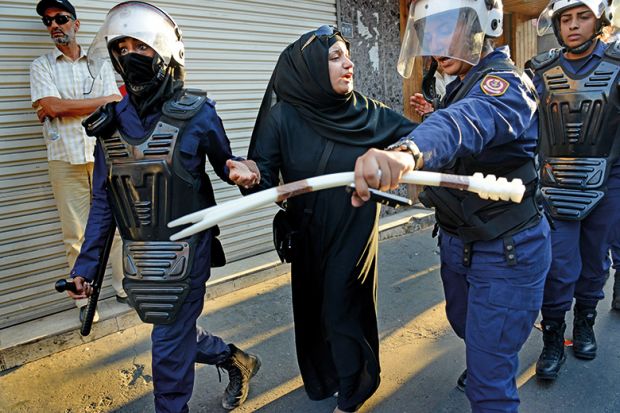The UK’s Higher Education Academy is under pressure to cut ties with Bahrain after academics warned that its activities in the country pose a “serious ethical and reputational risk” for the organisation.
In April, the University of Bahrain became the first HEA “global partner” in the Gulf region. The agreement means that the institution can award HEA fellowships to teaching staff at private institutions in the country when they successfully complete training at the University of Bahrain. The HEA is also developing an academic leadership programme for the region, which will be hosted by the University of Bahrain.
The HEA has eight subscribing institutions and more than 400 HEA fellows, including 132 at the University of Bahrain, in the Gulf region.
But Mike Diboll, former head of continuing professional development at the university’s Bahrain Teachers College, said that the partnership “undermines the values that the HEA was established to promote, and is a serious ethical and reputational risk for the HEA”.
“I was an eyewitness to the key events of the 2011 uprising and its murderous suppression following the Saudi intervention of that year. I personally taught students who were subjected to serious judicial and extrajudicial persecution, and I am aware of the ways in which the UoB was complicit in the suppression of students’ and faculty’s human rights and academic freedoms,” he said.
He added that the university would “use the partnership as a form of PR to sanitise and normalise the Bahrain regime (to which the UoB is very close in terms of financing and governance)”.
Dr Diboll, who worked at the university between 2007 and 2011, suggested that the HEA’s partnership with the country has been “influenced by the trade and foreign policy agenda of the present UK government”, which has “stipulated that the education sector should be a priority area for the expansion of trade in the Gulf following Brexit”.
Another potential factor is that the HEA is now funded primarily through subscriptions from universities, rather than by grants from UK funding bodies.
“The HEA probably faces the ‘stick’ of funding cuts…and the ‘carrot’ of the Bahrain regime rolling out the red carpets as the Gulf states can do so well when it suits them, and the possibility of further lucrative contracts in the GCC [Gulf Cooperation Council],” Dr Diboll said.
Christopher Davidson, reader in Middle East politics at Durham University, said that he had been “surprised and saddened” to hear about the HEA’s involvement with Bahrain.
“To my mind, this [activity] serves to legitimate a key state institution operated by an increasingly repressive regime: although it probably helps the HEA to tick an ‘internationalisation box’, it ultimately provides Bahrain with an important ‘soft power’ opportunity to launder its image in Britain and, more generally, in academic and elite circles,” he said.
Mark Jones, chief operating officer of the HEA, said that the organisation “carefully considers where and how it works internationally” and follows advice from the government, “particularly on the advisability of work and travel outside the UK”.
It also draws on “other appropriate recommendations, such as those resulting from the Universities UK delegation to Bahrain and the United Arab Emirates in March this year”, he said.
“While no decision is ever clear-cut…we feel it is better to engage than not and that this is consistent with the HEA’s overarching charitable objects.”
He added that the HEA’s work in the Gulf and other regions “pre-dates and is totally unrelated to government trade and foreign policy resulting from Brexit”.
Waheeb Essa Alnaser, vice-president for academic programmes and graduate studies at the University of Bahrain, said that the university “can’t allow education to be politicised”.
“UoB’s focus is education. Partnerships would serve only students at the university, their advancement, their progress,” he said.
Register to continue
Why register?
- Registration is free and only takes a moment
- Once registered, you can read 3 articles a month
- Sign up for our newsletter
Subscribe
Or subscribe for unlimited access to:
- Unlimited access to news, views, insights & reviews
- Digital editions
- Digital access to THE’s university and college rankings analysis
Already registered or a current subscriber? Login







